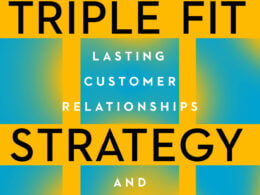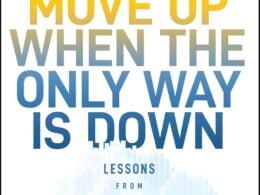The following excerpt is from “Vitamin B (For Business),” written by Petra Coach founder and CEO, Andy Bailey. For more information, visit petracoach.com/vitamin-b.
The B vitamin is essential for the health of your brain, nervous system and, really, the entire body. Similarly, “Vitamin B (For Business)” is vital for company leaders – improving the health of your organization with daily mental supplements.
As a lifelong entrepreneur, the idea of taking a small, effective action every day toward a goal has been the cornerstone of every one of my successes. I’ve spent my life listening to thought leaders, reading hundreds of books, attending countless events and working with hundreds of teams.
And it all boils down to this: Take daily action on what you are learning. Nothing ever happens if you don’t.
StartupNation exclusive discounts and savings on Dell products and accessories: Learn more here
The difference between having a job and having a business
Most business owners aren’t in it just for the money. In fact, in many cases, they could earn more money, with fewer headaches, working for your average large corporation.
Instead, what attracts most of us to start a business is the need for more freedom. Unfortunately, many business owners end up simply harnessing themselves to another job.
I know because I’ve been there. I owned a wireless business for 18 years, and for the first nine years, I was working for this unmerciful jerk I saw in the mirror each morning. I had created myself a job, not a business. And in doing so, it made me miserable.
However, for the last nine years of my company, I worked on building a business with clear and sustainable processes that were led by very capable people. Not only was I much happier, but I was also able to create something I could sell and exit because it could run without me.
And that, my friends, is the difference between a job and a business. If it can run without you, you’ve built a business. If it can’t, you’ve created another job for yourself.
Creating your company values
Every fingerprint is unique, and no two snowflakes are exactly alike. Similarly, each company has a particular set of core values that define every daily business decision, from how phone calls are answered to which technology is leveraged. Without clearly defined core values, an organization lingers in a constant state of an identity crisis. But classifying exactly what’s most important to you and your company isn’t always easy.
Ask yourself: What are the essential qualities every employee must possess? What drives your business decisions? Does everyone in your company share the same motivations and priorities? Are there certain fundamentals you’re not willing to compromise on?
Brainstorm with your team
This is one of the best insights into what’s critical to your company. Write down whatever comes to mind with a “there are no wrong answers” attitude. Discuss other team members. What do you admire about them? Which of their attributes and behaviors exemplify the best elements of your company culture? Set a time limit to ensure you don’t overthink: 15 to 30 minutes should do it.
Related: No Try, Only Do: Early Lessons in Entrepreneurship
Put all your ideas on the table (or wall)
Look at all your ideas and see what jumps out. Anything surprising that even you can’t believe you wrote down? If possible, wallpaper the room with large sticky notes for everyone to see. Step back and take a look at your options from a different point of view.
Hold an auction
Ask yourself, “If I had $4,000, and each value cost $1,000, where would I put my money?” You’ll be amazed by how fast this narrows your choices and reveals what you value most.
Then, you’ll be on the fast track to defining your company’s core values.
You’re not tacos and ice cream
Is that title confusing? Let me explain: What do tacos and ice cream have in common? They are both delicious and tend to make people happy.
But you are not tacos and ice cream (as much as we want to believe the “you are what you eat” principle), which means you cannot make everyone happy.
I repeat: Unless you are filled with cheese and salsa or topped with hot fudge and sprinkles, you cannot make everyone happy.
So, don’t hold yourself to that standard. Obviously, as a leader, it’s your job to make sure your team is satisfied, healthy and supported. But when it comes down to making the hard choices, there will always be someone who disagrees with your decision – or at least isn’t 100 percent happy about it.
The goal is to make those calls to the best of your ability based on what’s best for the team as a whole.
The principle applies in other areas of your life, too, such as your schedule. You only have 24 hours in your day, so don’t say “yes” if you genuinely don’t have time to take on that new thing. Sometimes you have to turn down a task or an opportunity if you don’t have the capacity for it. The asker may be disappointed, but they’ll understand if you’re honest with them.
When you put your all into pleasing others, you most likely will trade in your happiness, and it becomes a vicious cycle.
While your happiness and others’ happiness are equally important, leave the “always happy” heavy lifting for tacos and ice cream. They can handle it.
Know your financial KPIs
Understanding financial metrics is essential for all leaders, and that means having timely data at your fingertips. A financial dashboard with the right key performance indicators (KPIs) will help you evaluate the financial health and performance of the business on a daily, weekly and monthly basis. It will also serve as an early-warning system to identify potential challenges.
Here are a few important metrics to include in your dashboard:
- Operating cash flow: Shows an adjusted net income that factors in non-cash expenses (depreciation and amortization) and other items, such as changes to inventory, accounts receivable and accounts payable.
- Gross profit margin: Measures the percentage of revenue that exceeds the cost of goods sold; it gauges your company’s ability to pay for other operating costs.
- Days sales outstanding: Shows the average number of days it takes your clients to pay their invoices.
- Accounts receivable aging: Lists invoices that need to be paid by your customers and how effective your accounts receivable team is in collecting that cash.
- Inventory turnover: Calculates the average number of times in a year your business sells and replaces its inventory.
- Budget variance: Compares actual results to budget totals; this evaluates how your company is performing financially compared to forecasted results.
Every business has different critical numbers. As the company leader, it’s your job to make sure you’re watching the right ones like a hawk, so you can keep your company moving forward.
Sign Up: Receive the StartupNation newsletter!
My goodness, this is hard
I realize the habits I teach, while simple in concept, can be very difficult to execute – especially consistently.
I vividly remember a time when I was building my wireless company, NationLink Wireless, and I had recently attended Verne Harnish’s “Birthing of Giants” program at the Massachusetts Institute of Technology.
I came back from that session determined that our company was going to be one of the rare few that implemented the philosophies and strategies Verne espoused. One of the first things we started was daily huddles – and I was truly surprised when I found out that no one in the company wanted to do it.
That was only the beginning. We started implementing other steps that are part of the Rockefeller Habits and I could see that they were not sinking in with our team. I was frustrated. The team was frustrated. And everyone was complaining about the new system they were being made to follow.
Determined not to let frustration hold us back, I called Verne and told him the “Habits” weren’t working and that team members were not happy. He joined us on the phone during our daily morning huddle and reported back that we were “doing fine. You’ve just got to keep doing it. In 60 days, it will be a habit and then it will be part of your organization forever. You just can’t give up on it.”
It was some of the best advice I’ve ever received. And it was true.
Remember, if it was easy, everyone would be a leader or business owner. Don’t give up on what you believe.
“Vitamin B (For Business)” is available now wherever books are sold and can be purchased via StartupNation.com.






